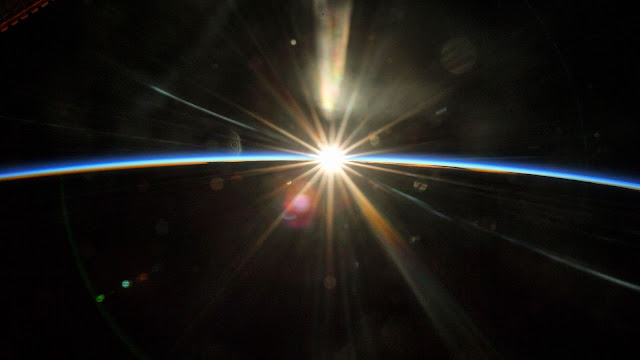ISS - Expedition 67 Mission patch.
July 26, 2022
The Expedition 67 crewmembers aboard the International Space Station spent Tuesday predominantly on research, maintenance, and cargo transfer operations.
Research beneficial to humans on Earth and future crews in space is happening around the clock aboard the orbiting laboratory. NASA Flight Engineer Kjell Lindgren used a majority of his day to service samples for the Immunosenescence investigation inside the Life Science Glovebox. Results from this study may one day inform treatments for accelerated aging processes commonly observed in microgravity and contribute to countermeasures for normal aging progression.
Image above: NASA astronaut and Expedition 67 Flight Engineer Bob Hines is pictured during maintenance activities inside the International Space Station’s Unity module on May 14, 2022. Image Credit: NASA.
NASA Flight Engineer Bob Hines inspected the Cold Atom Lab (CAL) Moderate Temperature Loop Jumper to check for leaks. In the CAL, atoms are chilled to temperatures near absolute zero, allowing scientists to observe fundamental behaviors and quantum characteristics not possible on the ground.
Meanwhile, NASA Flight Engineer Jessica Watkins set up hardware and worked on the Space Fibers-3 space manufacturing study. ESA (European Space Agency) Flight Engineer Samantha Cristoforetti took over Space Fiber-3 study runs later in the day.
Image above: The Sun's rays begin to illuminate the Earth's atmosphere as the International Space Station flew into an orbital sunrise 261 miles above Texas, as seen in this image taken by astronaut Bob Hines. Image Credit: NASA.
Early in the day, Cristoforetti swapped samples inside the Electrostatic Levitation Furnace, an advanced research device that enables high-temperature thermophysics studies.
A larger contingent of the crew — Cristoforetti, Hines, Lindgren, and Watkins — took turns transferring cargo from the SpaceX CRS-25 Dragon spacecraft.
Maintenance tasks continued in the Russian segment, with Commander Oleg Artemyev of Roscosmos checking for leaks in the Zvezda service module and Flight Engineer Denis Matveev refilling freon bottles to maintain the orbiting laboratory’s air-conditioning system. Matveev also set up dosimeters for a long-running radiation detection experiment while cosmonaut Sergey Korsakov worked on the Cardiovector study.
Related links:
Expedition 67: https://www.nasa.gov/mission_pages/station/expeditions/expedition67/index.html
Immunosenescence: https://www.nasa.gov/mission_pages/station/research/experiments/explorer/Investigation.html?#id=8343
Life Science Glovebox: https://www.nasa.gov/mission_pages/station/research/experiments/explorer/Facility.html?#id=7676
Cold Atom Lab (CAL): https://www.nasa.gov/mission_pages/station/research/experiments/explorer/Facility.html?#id=7396
Space Fibers-3: https://www.nasa.gov/mission_pages/station/research/experiments/explorer/Investigation.html?#id=7375
Electrostatic Levitation Furnace: https://www.nasa.gov/mission_pages/station/research/experiments/explorer/Facility.html?#id=1536
Zvezda service module: https://www.nasa.gov/mission_pages/station/structure/elements/zvezda-service-module.html
Radiation detection experiment: https://www.nasa.gov/mission_pages/station/research/experiments/explorer/Investigation.html?#id=633
Space Station Research and Technology: https://www.nasa.gov/mission_pages/station/research/overview.html
International Space Station (ISS): https://www.nasa.gov/mission_pages/station/main/index.html
Images (mentioned), Text, Credits: NASA/Heidi Lavelle.
Best regards, Orbiter.ch



